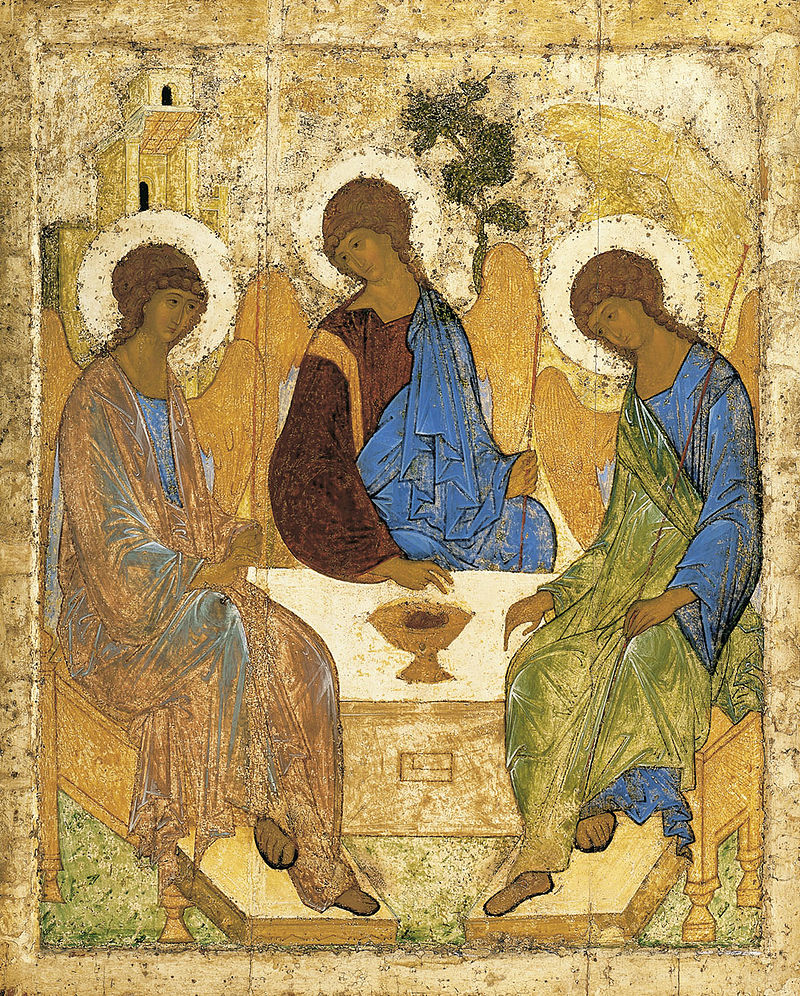Last Sunday was Trinity Sunday. The word “Trinity” doesn’t appear in Scripture, although there are hints, particularly in the Great Commission (Matt 28:19) and Paul’s farewell in Second Corinthians (2 Cor. 13:13). The word itself first appears in the late second-century writing by Tertullian called Against Praxeas. There are different ways of approaching the Trinity. One of the more common is from a functional perspective – The Creator Father who brings about the world, the Redeemer Son, who, in his Incarnation, delivers us from sin and death, and the Sanctifier Holy Spirit, who works within us to bring about a life of holiness and the perfection of love.
Another way of understanding the Trinity is in the Godhead’s creative function. In the Nicene Creed, we profess that the Father is the maker of heaven and earth. The Father, however, is not merely a manufacturer, like a watchmaker, who designs and builds something separate and apart from himself and then simply allows the created thing to operate on its own. Rather, as Paul affirms (quoting Epimenides of Crete (6th c. BC)) – “in him we live and move and have our being.” (Acts 17:28). What this means is that without the knowledge and presence of God, we would disintegrate back into the non-existence from which we were created. St. Athanasius (297-373), On the Incarnation, para. 4) Or as St. Augustine (354-430) writes: “If the power and might of the Creator who rules and embraces all, would pass away, all nature would perish. When a builder puts up a house and departs, his work remains despite the fact that he is no longer there. But the universe will pass away in the twinkling of any eye if God withdraws his ruling hand” (On the Literal Interpretation of Genesis 4.12.22). For this week think about how God the Father continues his creative work within you.
As to the Son, the Creed affirms that “Through him all things were made.” The Son is the agency through whom Creation comes about. Paul tells us that “all things . . . were created through him and for him and he is before all things, and in him all things hold together.” (1 Cor. 1:15-16) As John would later write “All things were made through him, and without him was not anything made that was made.” John 1:3. In Greek thought, the Divine Logos was the rational generative principle of the Universe which creates all things and works within matter to bring about an ordered universe. It is that which brings order out of the chaos. Both Paul and John apply this understanding of the Logos to the Son. It is the Father that creates, but this creation is formed, and carried out, and given order through the Son. As John Chrysostom (347-407) says: “The subsistence of all things depends on Christ. Not only did He Himself bring them out of nothing into being, but Himself sustains them now.” (Homily 3 on Colossians). The Son is the agency of the Father’s power to create, to order, and to sustain. For this week, meditate on the Son’s continuous ordering and redemptive work in your life.
We affirm that the Spirit is the “giver of life.” It is the Spirit that gives life. (John 6:63, 2 Cor. 3:6). In the second creation account, God forms and molds the clay that only becomes animate when God breathes his Spirit into it. (Gen. 2:7). Or as the psalmist points out the circle of life is a matter of God giving and withdrawing his Spirit. (Psalm 104:29-30). It is the Spirit that gives life to Jesus both in the Incarnation (Matt. 1:20) and the Resurrection (Rom. 8:11). The Spirit is the animating force within you, it is life itself. (Rom. 8:1-11). As the Roman catechism states: “The life that originates in the Father and is offered to us in the Son, is gifted to us in the Spirit.” (s.683). For this week contemplate the indwelling of the life-giving and sanctifying Spirit life.
The message of Christianity is that we are a new creation (Gal 6:15) and are being made new (Rev. 21:5). And it is in the fulness of the Trinty that this is accomplished.
Praise to the Trinity—the sound and life
Laus Trinitati, Hildegard of Bingen (1098-1179)
and creativity of all within their life,
the praise of the angelic host
and wondrous, brilliant splendor hid,
unknown to human minds, it is,
and life within all things.

